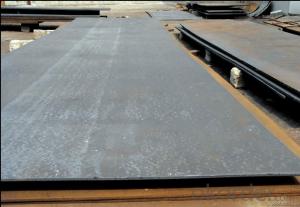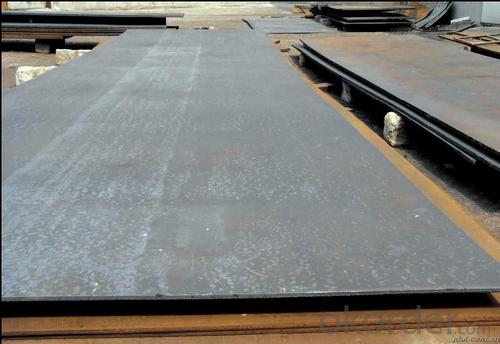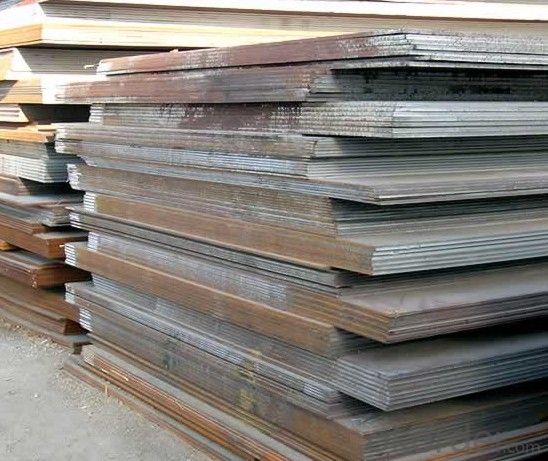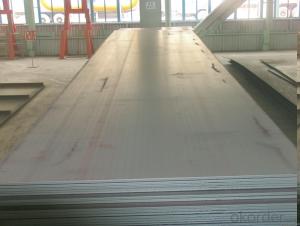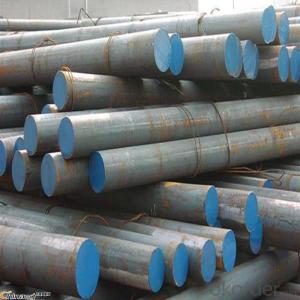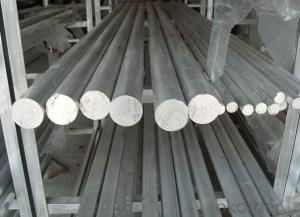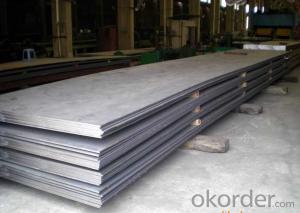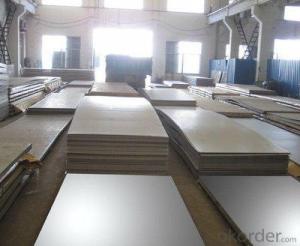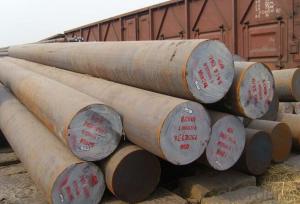Steel Plate3Cr2Mo/p20 Special Steel Alloy Steel
- Loading Port:
- China main port
- Payment Terms:
- TT OR LC
- Min Order Qty:
- 25 m.t.
- Supply Capability:
- 10000 m.t./month
OKorder Service Pledge
OKorder Financial Service
You Might Also Like
Specification
Chemical Composition(GB)%
C | Si | Mn | Cr | Mo | S | P |
0.34 | 0.5 | 0.8 | 1.7 | 0.42 | ≤0.030 | ≤0.030 |
Standard
GB | ASTM | DIN |
3Cr2Mo | P20 | 1.2311 |
Available Size
Rolled Plate:20-400mm×610mm×L
Heat Treatment
Item | Temperature℃ | Hardness |
Anneal | 710-740 | ≤220HB |
Quenching | 850-880 | 52-55HRC |
Tempering | 580-630 | 28-35HRC |
Characterstics
1.Good comprehensive mechanical properties | ||||||
2.excellent polishing performance and weld reapiring propery |
Applications: Suitable for large or medium sized and precise plastic moulds


1, Your advantages?
professional products inquiry, products knowledge train (for agents), smooth goods delivery, excellent customer solution proposale
2, Test & Certificate?
SGS test is available, customer inspection before shipping is welcome, third party inspection is no problem
3, Payment Terms?
30% TT as deposit and 70% before delivery.
Irrevocable L/C at sight.
4, Trading Terms?
EXW, FOB, CIF, FFR, CNF
6, After-sale Service?
We provides the services and support you need for every step of our cooperation. We're the business partner you can trust.
For any problem, please kindly contact us at any your convenient time.
We'll reply you in our first priority within 24 hours.
- Q: How is high-temperature steel used in power generation equipment?
- High-temperature steel is used in power generation equipment due to its excellent strength and heat resistance properties. It is specifically utilized in the construction of boilers, turbines, and heat exchangers, where it can withstand extreme temperatures and pressures. This steel ensures the efficient and safe operation of power plants by allowing them to generate electricity through the combustion of fossil fuels or nuclear reactions while enduring high operating temperatures without structural failure.
- Q: What are the applications of special steel in the agriculture supply chain?
- Special steel has various applications in the agriculture supply chain, including the manufacturing of agricultural machinery and equipment such as tractors, harvesters, and irrigation systems. It is also used in the production of storage containers, silos, and fencing materials for farms. Additionally, special steel is utilized for constructing infrastructure like bridges, railings, and support structures in agricultural facilities. Overall, the use of special steel in the agriculture supply chain ensures durability, strength, and longevity of essential equipment and structures, enhancing efficiency and productivity in the farming industry.
- Q: How is special steel used in the manufacturing of cutting tools?
- Special steel is used in the manufacturing of cutting tools due to its exceptional properties such as high hardness, wear resistance, and toughness. This type of steel allows for the production of durable and efficient cutting tools that can withstand the high forces and temperatures involved in cutting operations. Additionally, special steel can be heat-treated to further enhance its properties, making it ideal for creating sharp and long-lasting cutting edges.
- Q: How is special steel used in the production of automotive parts?
- Special steel is used in the production of automotive parts due to its exceptional strength, durability, and resistance to wear and corrosion. It is commonly used for manufacturing critical components such as engine parts, chassis, drive shafts, and suspension systems. Special steel helps enhance the overall performance, safety, and longevity of automobiles, making them more reliable and efficient on the road.
- Q: What are the main advantages of using special steel in the construction industry?
- The main advantages of using special steel in the construction industry are its high strength, durability, and resistance to corrosion. Special steel has superior mechanical properties compared to regular steel, allowing for the construction of stronger and more robust structures. It can withstand heavy loads, extreme weather conditions, and natural disasters, ensuring the safety and longevity of buildings. Additionally, its corrosion resistance properties reduce maintenance costs and extend the lifespan of structures, making it a cost-effective choice in the long run.
- Q: What are the main advantages of using special steel in the automotive industry?
- The main advantages of using special steel in the automotive industry are its high strength-to-weight ratio, improved durability and resistance to corrosion, and enhanced crashworthiness. Special steel allows for the production of lighter vehicles without compromising safety, resulting in improved fuel efficiency and reduced emissions. Additionally, its superior mechanical properties make it suitable for critical components, enhancing the overall performance and reliability of automobiles.
- Q: How does special steel contribute to the hardness of products?
- Special steel contributes to the hardness of products through its unique composition and manufacturing process. It contains alloying elements such as chromium, tungsten, and manganese, which enhance its strength and resistance to wear and tear. The controlled heat treatment during production further refines the steel's microstructure, resulting in increased hardness. This hardness enables special steel to withstand high pressures, impacts, and abrasive forces, making it ideal for applications where durability and strength are crucial, such as in tools, machinery, and construction materials.
- Q: How does the microstructure of special steel affect its performance?
- The microstructure of special steel plays a crucial role in determining its performance. It influences various mechanical properties such as strength, hardness, toughness, and wear resistance. By controlling the arrangement and size of the steel's grains, as well as the presence of any additional phases, manufacturers can tailor the material to meet specific requirements. For instance, a finer grain structure can enhance strength and hardness, while a uniform distribution of carbides can improve wear resistance. Consequently, optimizing the microstructure allows special steel to exhibit superior performance characteristics in specific applications.
- Q: How does special steel contribute to reducing product rejection rates in quality control?
- Special steel contributes to reducing product rejection rates in quality control by providing superior strength, durability, and resistance to wear and tear. These properties enable the production of high-quality components and eliminate common defects such as distortion, cracking, or premature failure. Additionally, special steel's precise composition and manufacturing processes ensure consistency and accuracy in the final products, reducing the likelihood of manufacturing errors and subsequent rejection during quality control inspections.
- Q: How does tungsten contribute to the properties of special steel?
- Special steel greatly benefits from the inclusion of tungsten, which is a critical element that significantly impacts its properties. One of the key advantages of incorporating tungsten into steel lies in its ability to enhance strength and hardness. This is achieved through the formation of a solid solution with iron, resulting in a microstructure with fine grains that effectively increase overall toughness and wear resistance. Furthermore, tungsten plays a pivotal role in improving the high-temperature strength of special steel. Due to its high melting point, tungsten maintains its strength even under elevated temperatures, making it an ideal choice for applications that require resistance to heat and thermal stress. Consequently, special steel containing tungsten can be employed in environments with extreme temperatures, such as gas turbines, rocket nozzles, and cutting tools. Another crucial contribution of tungsten lies in enhancing the corrosion resistance of special steel. By forming stable carbides, tungsten provides a protective barrier against corrosion and erosion, effectively enhancing the durability and longevity of the steel. This is particularly invaluable in industries where the steel is exposed to corrosive environments, such as chemical processing, marine applications, and oil and gas exploration. Moreover, tungsten significantly aids in the machinability of special steel. It assists in reducing the occurrence of built-up edges during cutting operations, resulting in improved surface finish and prolonged tool life. This characteristic proves highly advantageous in industries that require precision machining, such as automotive, aerospace, and tool manufacturing. In conclusion, the presence of tungsten in special steel is of utmost importance as it enhances strength, hardness, high-temperature performance, corrosion resistance, and machinability. Its unique properties make it an indispensable component in the production of high-quality steel utilized across various industries.
Send your message to us
Steel Plate3Cr2Mo/p20 Special Steel Alloy Steel
- Loading Port:
- China main port
- Payment Terms:
- TT OR LC
- Min Order Qty:
- 25 m.t.
- Supply Capability:
- 10000 m.t./month
OKorder Service Pledge
OKorder Financial Service
Similar products
Hot products
Hot Searches
Related keywords
